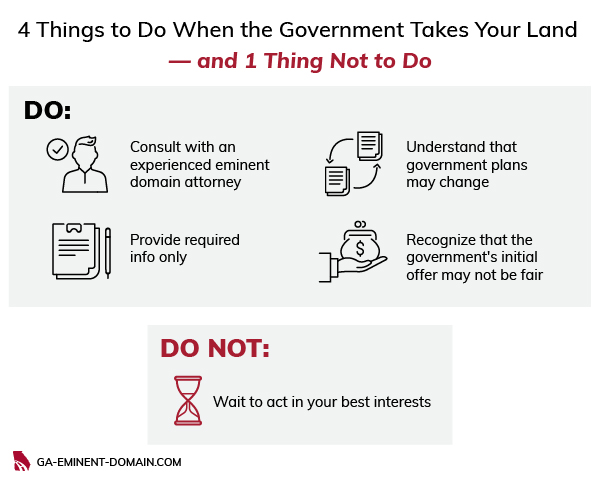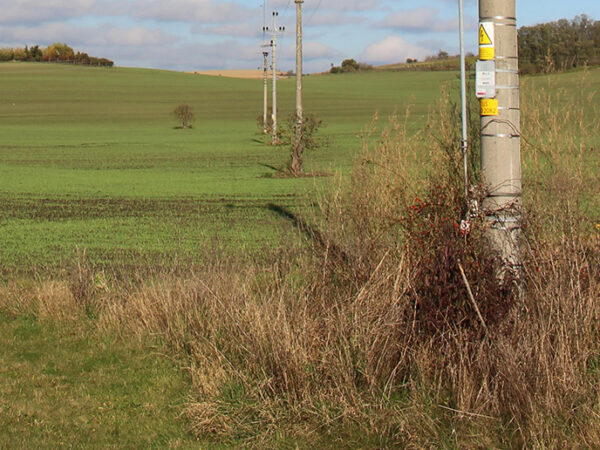The Fifth Amendment of the U.S. Constitution grants the government the right to take your private property for public use under the power of eminent domain. As an eminent domain attorney, I have consulted with many residential homeowners and commercial property owners who are shocked, and sometimes outraged, to learn that they must allow the government to purchase their property or acquire easements on their land.
Luckily, the doctrine of eminent domain does not render property owners helpless. It also requires that the government pay you, the property owner, just compensation. If the government sends you notice that it is planning on seizing your private land, you want to have a game plan for fighting for the highest possible compensation.
I always counsel clients to focus on the practical and urgent issues – such as how to fight for the highest valuation of their property so that they can receive fair market value for their residential or business property. Here are four important things to do – and one thing not to do – that every property owner should know as part of their game plan when a governmental authority informs you that they’re taking your land.

To Do #1 – Consult with an experienced eminent domain attorney
First and foremost, you should contact an eminent domain attorney. I know this may not sound surprising coming from an attorney, but there is plenty of upside and little, if any, downside to this advice.
The upside of consulting with an eminent domain lawyer includes having an experienced professional on your side who can help you:
- verify that the government’s reason for taking your property is really serving a public need
- determine if all your targeted property needs to be taken to meet that public need
- guide you through a complicated eminent domain proceeding
- advise you of your rights as a property owner
- fight for the fair market value of your property
- identify mistakes or inconsistencies in the government’s appraisal and offer
- seek compensation if remaining parts of your property are damaged by the taking
- and much more
At my firm, we minimize risk for our clients by advancing all the costs associated with the work we may need to do on their eminent domain case (such as obtaining appraisals and hiring experts). That’s because we work on a contingency fee basis.2
This means that we will not collect anything from you unless we obtain more for you than the government’s initial offer. We call this our no-fee guarantee. And if we obtain a better offer for you, our fee only comes from the additional amount we negotiated – the original offer is always 100% yours to keep.2

To Do #2 – Provide required info only
As the property owner, you may feel that you are the person who is best equipped to talk about your property and its value, and you may be tempted to share this information with government appraisers and agents who may be researching your property taking. I strongly advise against this.
While these individuals may be friendly, you must remember that they are working for an entity that likely wants to pay as little as possible for your land.
Do not tell them how much you think your property is worth or how much damage you think the taking may cause. You may be underselling the value of your property – or they may use your words against you later and claim that you don’t have a realistic concept of your property’s fair market value.
Only provide required information. Better yet, call our eminent domain team at 1-888-391-1339 for a free case evaluation before speaking with the government.
To Do #3 – Understand that government plans may change
Have you ever heard the phrase “nothing is constant but change?” It can certainly apply to eminent domain takings. There are many examples of eminent domain cases in which the government changed how it planned to use the property, such as when:
- the land in an easement that was originally acquired for a simple sewer line is dug up at a later date to install a larger sewer pipe. The language in an easement contract can sometimes be deliberately vague, putting the property owner at risk of larger impacts on their property later.
- a plan for a simple power line to be installed on condemned property is increased to multiple power lines. This can impact the value of your adjacent private property.
The government is entitled to change how it uses the condemned land, so expect the unexpected. Look for updated plans as the project develops, and consult with an attorney who has the connections, experience, and resources to help with this type of research.
To Do #4 – Recognize that the government’s initial offer may not be fair
Many property owners may assume that after the government has had their property appraised, there is little they can do counter that appraisal. This is simply not accurate. And this is also another area where an eminent domain attorney can be of significant assistance.
As I mentioned earlier, my firm will front the cost of an independent appraisal as needed, as well as the cost of other resources that can help determine the true value of your property. For example, we can enlist the assistance of experts, such as environmentalists, surveyors, and engineers, to help in evaluating your land’s fair market value.
I encourage you to never take the government’s initial offer without first talking to an eminent domain attorney – as soon as possible.
Do NOT wait to act in your best interests

Even experienced negotiators shouldn’t handle their eminent domain case without at least getting a free case evaluation from a knowledgeable attorney as soon as they think the government might be targeting their property.
Read how this savvy business owner almost settled for negotiating 2x the initial offer on his own – luckily he rethought his decision, called us, and ended up with 10x more money for his property.1
The Georgia Eminent Domain Law Firm can help you take control of your eminent domain case
We will use our resources and experience to level the playing field against the government, help protect your private property rights, and seek the highest possible compensation for your property.
We can do this because:
- We operate under two large, highly-successful parent firms – the Law Offices of James Scott Farrin and Monge & Associates – meaning we have the resources available to push for maximum value for our clients.
- We have relationships with engineers, land planners, and other experts who we can call on as needed to help compile evidence and build your eminent domain case.
- Our team truly cares. We have many happy clients and case results that speak for themselves. On average, we have gotten 197% more for our clients above their original offer!1
We understand how frustrating and upsetting it can be when the government takes your land, and we will put you and your concerns first throughout the eminent domain process. Contact us today at 1-888-391-1339 for a free case evaluation.
Frequently Asked Questions
Can the government take your property without paying for it?
The government must pay you for taking your land. The federal government states it in the Fifth Amendment: “nor shall private property be taken for public use, without just compensation.” And remember, property owners can also counter the government’s offer of what they consider “just compensation.”
Why can the government take your land?
The government can take your land for the public good under the power of eminent domain. Common examples of the types of projects it takes private property for include construction of:
- public roads and interstates
- airports
- water treatment facilities
- military bases
- fire stations and police stations
- public parks
- libraries
When the government takes private property, how much does it pay you?
The government is required to pay you fair compensation for your private property. Fair, or just, compensation should take into account the fair market value of the property and should consider the land’s “highest and best use,” or how a buyer might use or develop the land in a way that maximizes its value.
Remember, the government wants your property on their terms. Consult with an experienced eminent domain attorney to find out how much your land is really worth.
You May Also Be Interested In
Can a Property Owner Block an Easement?
7 Examples of Eminent Domain: Key Takeaways for Property Owners Like You
Landlocked Property Law: Can Eminent Domain Take Your Road Access?
What Is a Sewer Easement and How Does It Affect My Property


